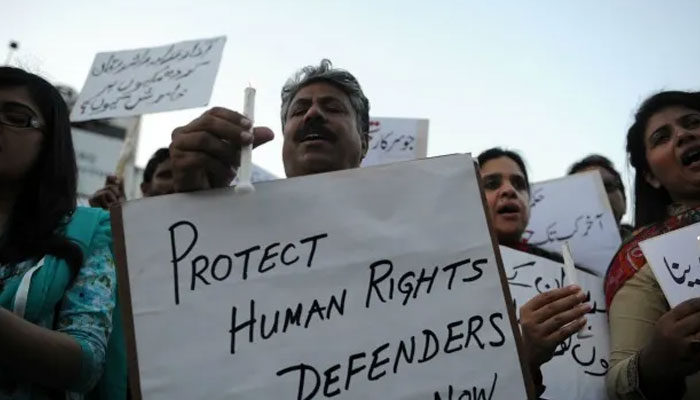The importance of rights
HRW’s letter is a good reminder for PM Shehbaz and his government
What is a democratic state if it does not guarantee the basic human rights guaranteed to its citizens under law? An undemocratic state. Surely, our new government would want to stay well away from such a tag. Which is why one hopes Prime Minister Shehbaz Sharif heeds Human Rights Watch’s call for the government to make human rights a key focus. In a letter to the new prime minister, Human Rights Watch (HRW) has said that the new government should adopt an agenda that actively promotes and protects human rights, advances rule of law, and strengthens democratic institutions. HRW has urged the Pakistani government to take concrete steps to protect fundamental civil, political, economic, social, and cultural rights in nine key areas: economic justice; electoral reforms; digital rights; freedom of expression and protecting civil society; freedom of religion and belief; prison reform; ending violence against women and girls; improving access to education; and protecting rights in counterterrorism operations. HRW is not alone in wanting a larger sense of rights during the process of governance. In a recent statement, Chief Justice Qazi Faez Isa has also said that no stone should be left unturned for the freedom of the press and that any intimidation of journalists is not to be tolerated.
Our country’s rulers – de facto and de jure both – tend to look towards countries where there has been economic progress in the absence of political and fundamental rights – without realizing the irony of citing undemocratic states while professing to be democratic. But here’s a fact: Pakistan’s vibrant civil society and political workers have fought for these rights over decades, and never has the country’s progressive section shied away from taking to the streets in protest. HRW’s letter is a good reminder for PM Shehbaz and his government that these rights enshrined in the constitution of Pakistan cannot be suspended in the name of political differences or national security.
Over the years, and especially since the 2018 government took over, we have seen how fundamental rights have been snatched away from politicians, dissidents, activists, journalists and anyone else. Time and again, the state and government has demonstrated sheer disregard for fundamental rights such as the right to protest, freedom of assembly, and the right to information. It has been weeks since X (formerly Twitter) has been blocked. Yet our rulers pretend as if nothing has happened. We are also pretending that people don’t have the right to protest, because when they do they are arrested. All this just taints the government’s democratic credentials. If it was about disturbing the public, then the government should have made sure that they had been provided an alternate route. Sure, protests could be held within some time and space bounds so that people are not disturbed but that certainly does not translate into arbitrary arrests. Most of the members of the current government were subjected to a witch-hunt by the PTI government. They have experienced first-hand what it is like to have political rights taken away. One hopes their experience and the maturity they have displayed over the past few years will lead them to continue reaching out across the aisle. What is also very important is that all talk of ‘rights’ must not disappear down a blackhole of rights for one particular party or at one particular time. Talk of rights includes right to unionise, peasants’ rights, professional associations’ right to protest, students’ rights. We hope the new government introduces a change in how governance works here: respecting people and their rights to the extent of letting them practise their rights as well.
-
 Alix Earle And Tom Brady’s Relationship Status Revealed After Cosy Super Bowl 2026 Outing
Alix Earle And Tom Brady’s Relationship Status Revealed After Cosy Super Bowl 2026 Outing -
 Why King Charles Has ‘no Choice’ Over Andrew Problem
Why King Charles Has ‘no Choice’ Over Andrew Problem -
 Shamed Andrew Wants ‘grand Coffin’ Despite Tainting Nation
Shamed Andrew Wants ‘grand Coffin’ Despite Tainting Nation -
 Keke Palmer Reveals How Motherhood Prepared Her For 'The Burbs' Role
Keke Palmer Reveals How Motherhood Prepared Her For 'The Burbs' Role -
 King Charles Charms Crowds During Lancashire Tour
King Charles Charms Crowds During Lancashire Tour -
 ‘Disgraced’ Andrew Still Has Power To Shake King Charles’ Reign: Expert
‘Disgraced’ Andrew Still Has Power To Shake King Charles’ Reign: Expert -
 Why Prince William Ground Breaking Saudi Tour Is Important
Why Prince William Ground Breaking Saudi Tour Is Important -
 AOC Blasts Jake Paul Over Bad Bunny Slight: 'He Makes You Look Small'
AOC Blasts Jake Paul Over Bad Bunny Slight: 'He Makes You Look Small' -
 At Least 53 Dead After Migrant Boat Capsizes Off Libya
At Least 53 Dead After Migrant Boat Capsizes Off Libya -
 'God Of War' Announces Casting Major Key Role In Prime Video Show
'God Of War' Announces Casting Major Key Role In Prime Video Show -
 Real Reason Prince William, Kate Broke Silence On Andrew Scandal Revealed
Real Reason Prince William, Kate Broke Silence On Andrew Scandal Revealed -
 Drew Barrymore Responds To 'Charlie's Angels' Costar's Comments About Her
Drew Barrymore Responds To 'Charlie's Angels' Costar's Comments About Her -
 Shakira Slips Hard On Stage During Life Show
Shakira Slips Hard On Stage During Life Show -
 King Charles Speaks Out Over Andrew's Scandal: 'Stand Ready To Help Police'
King Charles Speaks Out Over Andrew's Scandal: 'Stand Ready To Help Police' -
 Dax Shepard Recalls Horrifying Accident That Almost Killed Him
Dax Shepard Recalls Horrifying Accident That Almost Killed Him -
 Logan Paul's Bodyguard Hits Fan On Super Bowl Day
Logan Paul's Bodyguard Hits Fan On Super Bowl Day




